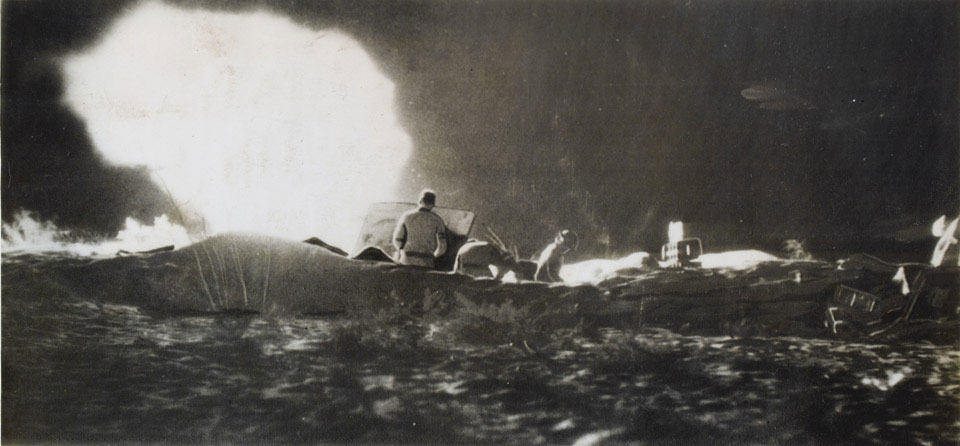



Source: Encyclopaedia Britannica
The Battles of El-Alamein, (1–27 July 1942, 23 October—11 November 1942), were a major turning point in the war for the Allied forces. After the First Battle of El-Alamein, Egypt (150 miles west of Cairo), ended in a stalemate, the second one was decisive. It marked the beginning of the end for the Axis in North Africa. The charismatic Field Marshal Erwin Rommel was comprehensively defeated by the British Eighth Army, and Allied material superiority meant that he had little chance of rallying his broken forces. Read through the resources below to learn more about these battles.
This article gives a very brief overview of the causes of the Battle of El Alamein, and the significance of the battle.
This article describes Australia's role in the Battle of El Alamein, and how important the battle was in the fight against fascism and why it has often been overlooked or forgotten by the Australian public.
The 9th Australian Division played a pivotal role in British 8th Army’s battles from July and November 1942 to halt the German and Italian advance towards the Nile and then to decisively defeat and force them to retreat. This article briefly discusses the battle, but also includes a slideshow of photos from the event.
Three major battles occurred around El Alamein between July and November 1942, and were the turning point of the war in North Africa. The Australian 9th Division, led by Lieutenant General Leslie Morshead, played a key role in two of these battles, enhancing its reputation earned defending Tobruk during 1941. This article looks at the role Australia played in these battles.
Arriving back in the African desert at dusk on October 25, 1942, an anxious German commander, Erwin Rommel, gave orders to break the British Eighth Army's new offensive in the north - directly attacking the 9th Australian Division.
The Battle of El Alamein, launched two days earlier by Britain's General Bernard Montgomery in an exposed and featureless desert near the Mediterranean Sea, was to that point the most important British offensive of World War II. On Montgomery's initiative would depend Winston Churchill's entire Mediterranean strategy and his conviction that the Middle East must be secured before any campaign to liberate Europe from Nazi control. Read through this article to learn more.
The Battle of El Alamein did much to restore British morale during World War Two, and is remembered by the Allied forces with pride. Examine why it deserves its place in history.
The Second Battle of El Alamein was a turning point in the North African campaign. It ended the long fight for the Western Desert, and was the only great land battle won by the British and Commonwealth forces without direct American participation. The victory also persuaded the French to start cooperating in the North African campaign. Read through this article to learn more.
Fought near the western frontier of Egypt between 23 October and 4 November 1942, El Alamein was the climax and turning point of the North African campaign in the Second World War (1939-45). The Axis army of Italy and Germany suffered a decisive defeat by the British Eighth Army. Read through this website to learn more.
At 9.40pm on Friday 23 October 1942, the Battle of El Alamein began with a four-hour ground and air bombardment launched by Britain and its allies. As it subsided, the troops began their advance. Read through this website to learn more.
The Battle of El Alamein, fought in the deserts of North Africa, is seen as one of the decisive victories of World War Two. The Battle of El Alamein was primarily fought between two of the outstanding commanders of World War Two, Montgomery, who succeeded the dismissed Auchinleck, and Rommel. The Allied victory at El Alamein lead to the retreat of the Afrika Korps and the German surrender in North Africa in May 1943. Read through this article to learn more.
The First Battle of El Alamein was fought July 1-27, 1942, during World War II (1939-1945). Having been badly defeated by Axis forces at Gazala in June 1942, the British Eighth Army retreated east into Egypt and assumed a defensive position near El Alamein. Pursued by Field Marshal Erwin Rommel, the British constructed an elaborate array of defenses. Read through this article to learn more.


When Erwin Rommel died-by forced suicide at Hitler's command-he left behind in various ingenious hiding places the papers that recorded the story of his dramatic career and the exact details of his masterly campaigns. It was his custom to dictate each evening a running narrative of the day's events and, after each battle, to summarize its course and the lessons to be learned from it. He wrote, almost daily, intimate and outspoken letters to his wife in which his private feelings and-after the tide had turned-forebodings found expression. To this is added by Rommel's son Manfred the story of the field marshall's last weeks and the final day when he was given the choice of an honorable suicide or an ignominious trial for treason. An engrossing human document and a rare look at the mind of the "Desert Fox," The Rommel Papers throws an interesting light on the Axis alliance and on the inner workings of Hitler's high command.

Gunners of the Royal Artillery open fire with their 25-pounder field guns during a barrage of enemy positions on the night before the 8th Army's main attack on Rommel's forces in Egypt on 23 October 1942.


 A short history of World War II
by
A short history of World War II
by